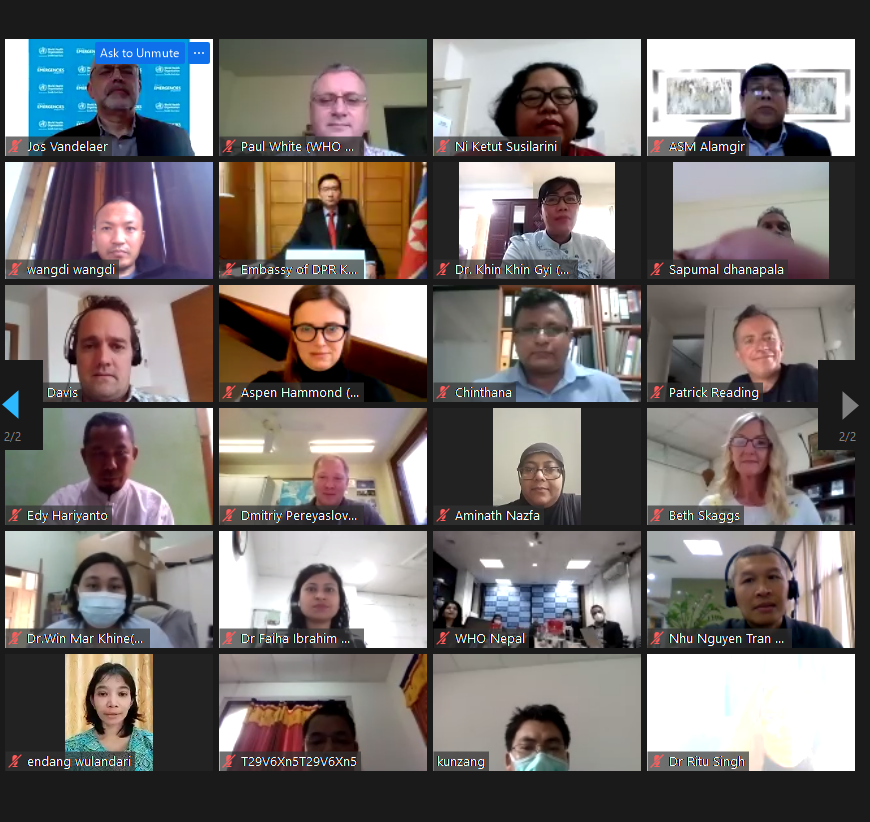A decade of Pandemic Influenza Preparedness in the WHO’s South East Asia region (SEAR) helped Member States (MS) to strengthen national influenza surveillance systems and virus detection capacity. However, the overwhelmed health systems due to the COVID-19 pandemic have negatively affected Influenza surveillance, laboratory diagnosis and virus sharing with WHO Collaborating Centres.

Considering the disruptions to national influenza sentinel surveillance and the missed opportunity of using synergies of influenza and COVID-19 surveillance in the context of the COVID pandemic, WHO’s Global Influenza programme (GIP) developed an interim guidance on maintaining surveillance of influenza and monitoring SARS-CoV-2 by adapting national influenza sentinel surveillance systems during the COVID-19 pandemic. In order to stimulate countries to effectively and timely adapt and implement recommendations in the above guidance, the Health Emergency Department at the Regional Office of the WHO ‘s South East Asia region (SEARO) organized a virtual “Regional meeting on implementation of WHO guidance on maintaining influenza surveillance and monitoring SARSCoV-2 through national sentinel surveillance systems during the COVID-19 pandemic in SEAR Member States” on 13-14 January 2021
The objective of the meeting was to consult SEAR Member States and agree on a plan for implementation of the WHO interim guidance on maintaining sentinel surveillance of influenza and using influenza sentinel surveillance systems for monitoring SARSCoV-2 through national sentinel surveillance systems in the context of the COVID-19 pandemic.
The meeting was attended by participants from the National Influenza Programmes of SEAR Member States, WHO Collaborating Centre at the Victorian Infectious Diseases Reference Laboratory (VIDRL), representatives from the Global Influenza Programme (GIP) and Thailand and India offices of the United States Centers for Disease Control and Prevention (US CDC).
Among the set of recommendations on surveillance, data sharing and laboratory diagnosis, following were noteworthy:
MS experiencing disruptions to sentinel surveillance were recommended (a) to address specific disruptions, reexamine priority influenza surveillance objectives and continue surveillance or (b) prioritize sentinel surveillance sites based on available capacity/resources for continuing /maintaining surveillance in these prioritized sites in accordance with defined objectives. The documentation of changes to surveillance was requested to aid in interpretation of data.
For MS that cannot collect weekly minimum of 100 samples for influenza through the national ILI/SARI sentinel surveillance system, it was recommended to test COVID 19 negative samples compatible with existing ILI/SARI case definitions to make up the recommend minimum
Considering the overwhelmed laboratories and lack of human resources for testing, all MS were encouraged to consider using Multiplex kits for testing both Influenza and SARS CoV-2, preferably using the WHO recommended algorithm.
MS were recommended to plan for shipping selected Influenza viruses (even if it is one or few) to WHO CC by January 31, 2021 for the February 2021 and by August 15, 2021 for the September 2021 in order to be ready for Vaccine Composition Meetings for Southern and Northern hemisphere influenza seasons
